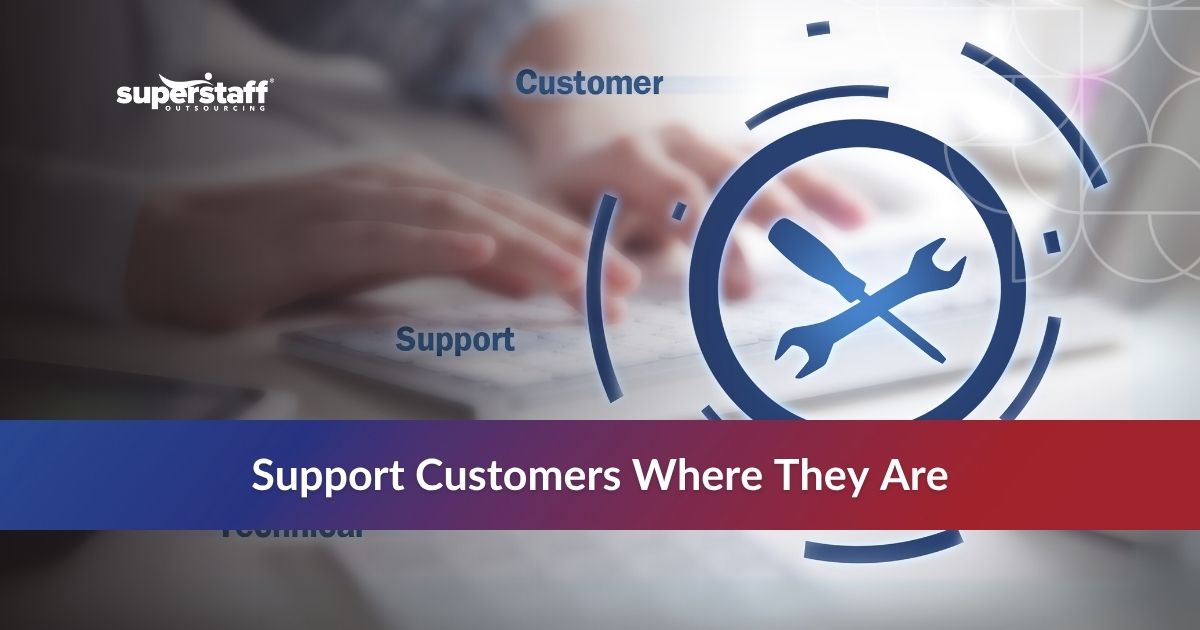
The journey toward approving the European Union’s Supply Chain Audit Law (Corporate Sustainability Due Diligence Directive or CSDDD) has been far from smooth. After the final draft was released on January 30, optimism quickly became uncertain as member states, including Germany, expressed reservations about specific provisions.
A series of closed-door negotiations, false starts, and political maneuvering ensued, culminating in a roller coaster of emotions for sustainability advocates. But on March 15th, after weeks of anticipation and back-and-forths, the European Council finally approved the CSDDD, marking a significant step forward in corporate accountability for supply chains’ environmental and human rights issues.
As the directive pushes through the legislative mills, manufacturing and distribution businesses must prepare to navigate the evolving regulatory landscape and embrace sustainability and ethical business conduct.
Understanding the CSDDD
The CSDDD, or the CS3D, is a legal framework obliging companies operating within the EU to conduct due diligence on sustainability issues. It mainly focuses on environmental concerns, climate change, and human rights violations. Beyond companies’ direct actions, it affects all their subsidiaries and supply chains, broadening its responsibility scope across the entire business ecosystem.
Initially proposed by the European Commission in February 2022, the directive aims to hold companies accountable for their operations’ environmental and social impacts. It requires them to identify, prevent, and mitigate adverse environmental effects and human rights abuses.
Ultimately, the CSDDD mandates developing and implementing prevention action plans, contractual assurances from business partners regarding compliance, and subsequent verification of adherence to these measures.
Key Provisions and Implications
Under the CSDDD, large companies operating in the EU must proactively address issues such as forced labor, child labor, and environmental degradation within their supply chains. Failure to comply with the directive could result in significant fines, up to 5% of a company’s global turnover.
The directive is poised to usher in a new era of corporate responsibility, emphasizing businesses’ integral role in addressing sustainability challenges. By extending liability beyond direct actions to encompass supply chain activities, the CSDDD holds companies accountable for their operational footprint, aligning with the growing calls for ethical and sustainable business practices.
What Does the EU’s Supply Chain Audit Law (CSDDD or CS3D) Mean for the Smaller Manufacturing and Distribution Firms?
At first glance, the CSDDD may seem to primarily target large corporations with over 1,000 employees and a net worldwide turnover exceeding €450 million ($486.8 million). However, the directive’s impact extends beyond these thresholds, encompassing affected companies’ subsidiaries and supply chains.
This means that EU-based SMEs and non-EU entities conducting business within the EU could indirectly bear the brunt of compliance requirements.
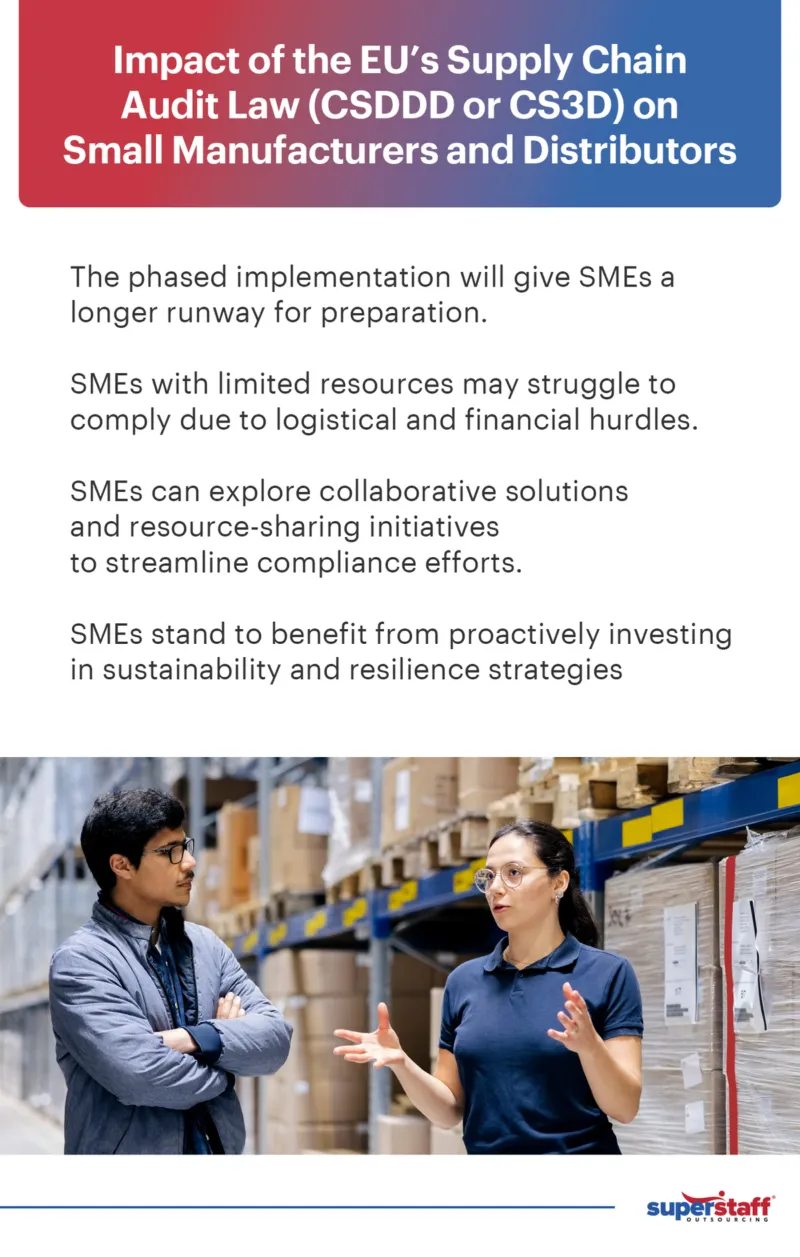
Phased Implementation: A Reprieve for SMEs
One aspect that offers some relief for smaller firms is the CSDDD’s phased implementation. While larger companies with 5,000 employees and €1.5 billion ($1.62 billion) turnover will feel the immediate effects within a year, SMEs have a longer runway for preparation.
Companies with 3,000 employees with €900 million ($973 million) turnover will be affected within four years, followed by those with 1,000 employees and €450 million ($486.8 million) turnover within five years. This phased approach provides SMEs additional time to adjust their processes and systems to meet the directive’s requirements.
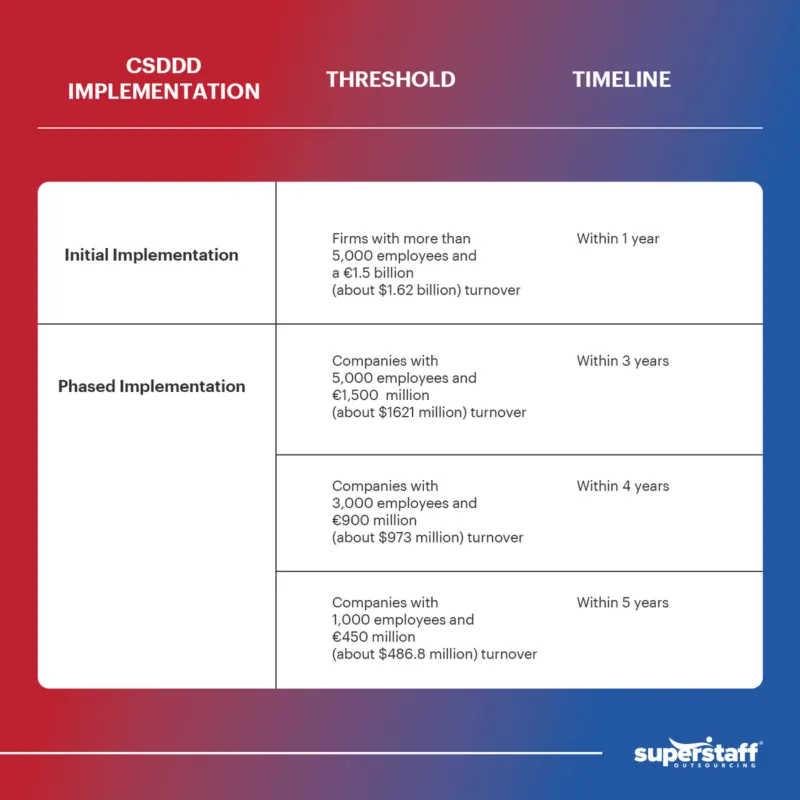
Navigating Compliance Challenges
Despite the extended timeline, SMEs should not underestimate the challenges of complying with the CSD.
The directive demands comprehensive due diligence on:
- Sustainability Issues
- Environmental Concerns
- Human Rights Violations
- Ethical Supply Chain Practices
For smaller manufacturing and distribution firms with limited resources, fulfilling these obligations may present significant logistical and financial hurdles.
Collaborative Solutions and Resource Sharing
In the face of these challenges, SMEs can explore collaborative solutions and resource-sharing initiatives to streamline compliance efforts.
Partnering with industry associations, trade groups, and other stakeholders can provide access to shared expertise, tools, and best practices for sustainable supply chain management. By pooling resources and knowledge, smaller firms can enhance their capacity to meet regulatory requirements while minimizing costs and administrative burdens.
Investing in Sustainability and Resilience
Beyond regulatory compliance, SMEs benefit from proactively investing in sustainability and resilience strategies. Embracing sustainable practices aligns with the principles of the CSDDD and enhances competitiveness, fosters customer loyalty, and mitigates risks associated with environmental and social impacts.
Integrating sustainability into their business models will help smaller firms position themselves as responsible corporate citizens and future-proof their operations against evolving regulatory frameworks.
What Should Smaller Manufacturing and Distribution Firms Expect?
The European Council’s recent approval of the CSDDD has set the stage for significant changes in the business landscape. As the EU’s Supply Chain Audit Law comes into effect over the next five years, smaller manufacturing and distribution firms must prepare for various challenges and disruptions in their operations.
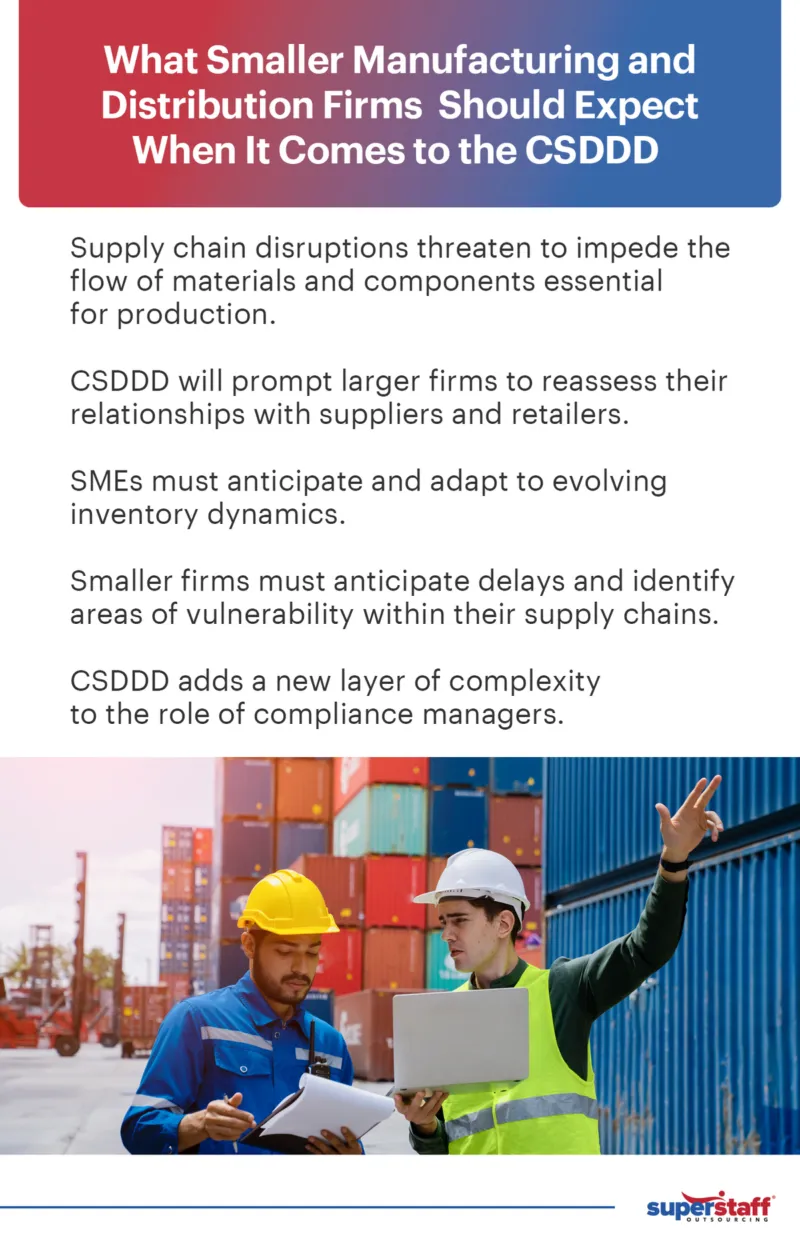
Supply Chain Bottlenecks and Disruptions
Among the biggest concerns is the looming specter of supply chain bottlenecks and disruptions, which threaten to impede the smooth flow of raw materials and components essential for production.
The rush to comply with the CSDDD could exacerbate existing vulnerabilities within supply chains, potentially leading to delays and interruptions in procurement processes. These bottlenecks pose logistical challenges and a significant risk to business operations and profitability. In this context, smaller firms must proactively identify and address potential bottlenecks before they escalate into a full-blown crisis.
Smaller manufacturing and distribution firms must adopt a multifaceted approach to mitigate these risks. First and foremost, they should explore alternative sourcing options to diversify their supplier base and reduce reliance on a single source. By establishing relationships with multiple suppliers, companies can enhance their resilience to disruptions and minimize the impact of supply chain bottlenecks.
Changes in Supplier and Retailer Consolidation
The enactment of the CSDDD heralds a new era of accountability and transparency in supply chain management, prompting larger firms to reassess their relationships with suppliers and retailers. In response to the stringent requirements imposed by the new law, larger companies may opt to consolidate their supplier and retailer networks, aiming to minimize exposure to risks of non-compliance.
To navigate this shifting landscape, smaller businesses must adopt a proactive approach and actively engage with their customers and suppliers. Smaller firms can differentiate themselves and mitigate the risk of being sidelined from supply chain networks by demonstrating a steadfast commitment to sustainability and compliance.
Furthermore, smaller companies must forge closer ties with their suppliers to ensure adherence to the required standards. Collaborative efforts between companies and their suppliers will become increasingly essential, focusing on providing support and training to improve sustainability practices throughout the supply chain.
Fluctuations in Inventory
One notable impact of this directive is the anticipated fluctuations in inventory levels across industries. As companies strive to align with the CSDDD’s sustainability standards, it’s imperative for businesses, especially smaller firms, to anticipate and adapt to these inventory dynamics effectively.
Anticipating Shifts in Inventory
The adoption of sustainable procurement practices necessitated by the CSDDD is poised to disrupt traditional supply chains. Companies will be compelled to reassess their sourcing strategies, opting for suppliers who adhere to ethical and environmental standards outlined in the directive. Consequently, this shift may lead to fluctuations in inventory levels as businesses recalibrate their procurement processes and transition to more sustainable suppliers.
Monitoring Demand Patterns
For smaller firms, closely monitoring demand patterns will be paramount in navigating inventory fluctuations triggered by CSD implementation. Businesses can gain insights into evolving customer preferences and market trends by leveraging data analytics and predictive modeling. With this information, companies can adjust their inventory levels accordingly, ensuring they can meet customer demands while minimizing the risk of stockouts or excess inventory.
Customer Satisfaction Decline Due to Delays
CSDDD necessitates reevaluating supply chain practices, which could potentially disrupt delivery schedules and lead times. Smaller firms must anticipate these challenges and proactively identify areas of vulnerability within their supply chains.
Proactive customer service plays a pivotal role in mitigating the impact of supply chain disruptions on customer satisfaction. Smaller firms should prioritize responsiveness and attentiveness, promptly addressing customer inquiries and concerns. By adopting a proactive approach to customer service, businesses can demonstrate empathy and commitment to customer-centricity, fostering loyalty and retention even amidst delivery delays.
Strategies for Maintaining Customer Satisfaction
To uphold customer satisfaction amid supply chain disruptions, businesses can implement several proactive strategies:
- Real-Time Communication: Provide timely updates and notifications regarding any changes in delivery schedules or lead times, ensuring transparency and managing customer expectations.
- Personalized Support: Offer personalized support to customers impacted by delivery delays, demonstrating empathy and understanding of their individual circumstances.
- Streamlined Resolution: Implement efficient processes for resolving customer issues and inquiries, minimizing the inconvenience caused by supply chain disruptions.
- Continuous Improvement: Continuously evaluate and optimize communication and customer service strategies based on feedback and insights, striving for continuous improvement and excellence.
Increased Expenditures for Compliance
For compliance managers, the CSDDD adds a new layer of complexity to their role. While their responsibilities traditionally revolved around ensuring adherence to predefined guidelines, the directive mandates a broader scope of compliance, encompassing specific standards outlined therein. Compliance managers must now oversee the alignment of materials, processes, and suppliers with these standards, spanning environmental, human rights, and ethical considerations.
Cost Implications for Smaller Firms
Compliance with the CSDDD comes at a cost, particularly for smaller businesses. Investments in due diligence processes, sustainability initiatives, and regulatory compliance measures are inevitable. These financial burdens can strain smaller firms’ resources, necessitating careful budgeting and strategic financial planning. To mitigate these costs, businesses must explore avenues to optimize operational efficiency without compromising on compliance standards.
Establishing Robust Systems and Processes
To meet the requirements of the CSDDD, compliance managers must establish robust systems and processes for monitoring compliance across the supply chain. This includes ensuring the ethical and sustainable sourcing of materials and enforcing adherence to human rights and environmental standards among suppliers. Proactive monitoring, coupled with stringent enforcement mechanisms, is essential to uphold the integrity of the compliance framework.
Strategic Partnerships and Support
Merely severing ties with high-risk or noncompliant suppliers isn’t a foolproof strategy for compliance. The CSDDD encourages companies to engage with such partners actively, prioritizing relationships with higher risk profiles and advocating for change. Offering support tailored to the needs of these suppliers, whether through training, favorable financial terms, or partnerships with competitors, can bolster compliance efforts and foster a culture sustainability throughout the supply chain.
Why Outsource to the Philippines: A Guide for Businesses Facing the CSDDD
In the wake of the European Council’s approval of the CSDDD, businesses across the EU are gearing up to meet the challenges of compliance with this far-reaching legislation. As companies prepare to navigate the complexities of the CSD and ensure the sustainability of their supply chains, many are turning to the Call Center of the World, a premier outsourcing destination.
Outsourcing to the Philippine call centers and BPO providers offers several advantages for companies looking to comply with the CSDDD while maximizing cost savings and efficiency.
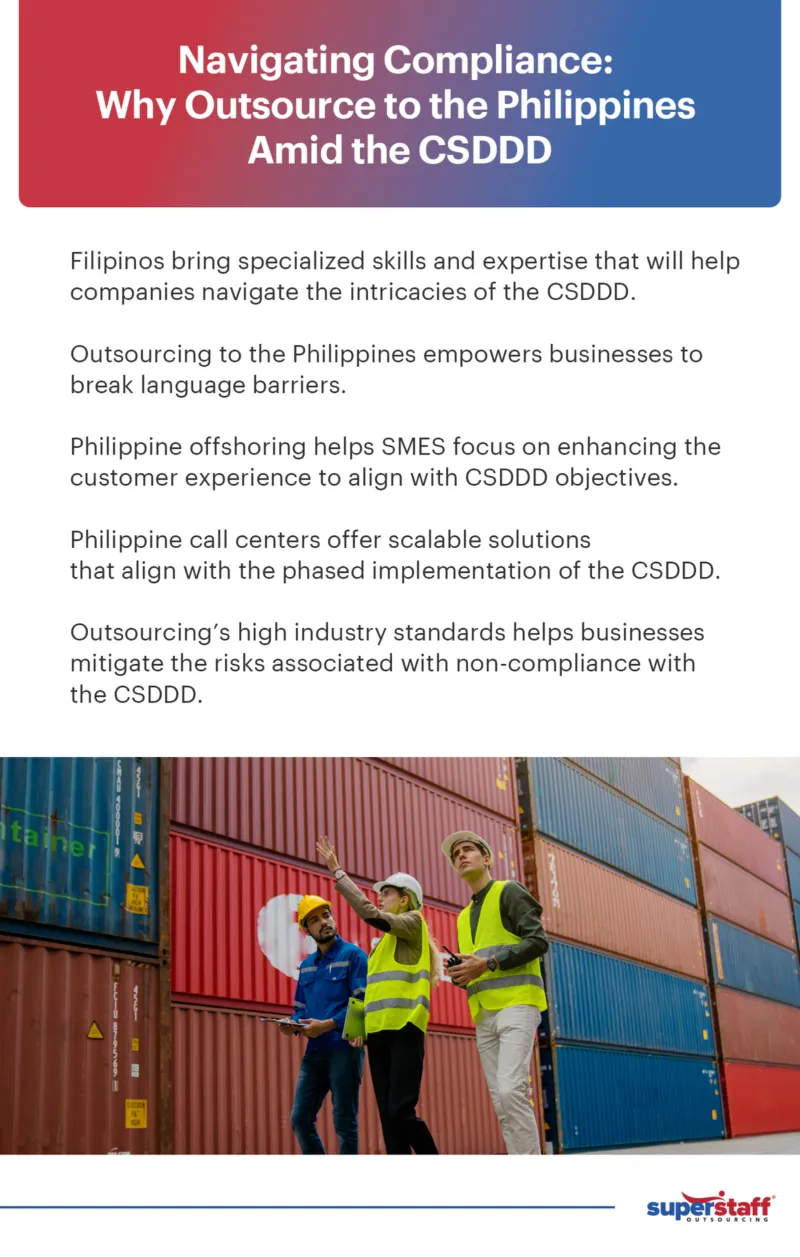
What Is Outsourcing?
Outsourcing involves contracting out certain business functions or processes to external third-party vendors or service providers. It typically includes customer service, IT support, manufacturing, accounting, etc. Its main goal is to leverage external providers’ specialized expertise, resources, and cost efficiencies to enhance operational efficiency, reduce costs, and focus on core business activities.
Outsourcing can be done domestically (onshoring), in neighboring countries (nearshoring), or internationally in distant countries (offshoring), with companies often choosing locations that offer specific advantages such as lower labor costs, access to skilled talent, or favorable regulatory environments.
Cost Savings and Increased Efficiency
Delegating specific tasks related to sustainability due diligence often leads to cost savings and increased business efficiency. While maintaining in-house teams and resources dedicated to compliance can be expensive and resource-intensive, Philippine call center outsourcing offers a cost-effective solution due to lower labor costs than many Western countries.
This empowers businesses to achieve compliance with the CSDDD more cost-efficiently while streamlining their operations for increased efficiency.
Access to Skilled Talent
One of the primary advantages of outsourcing in the context of the CSDDD is the access to specialized expertise.
The Philippines boasts a large pool of skilled professionals proficient in English, making it an ideal destination for offshoring customer service, IT, back office, and other critical services. Business Process Outsourcing (BPO) vendors in the Philippines work with agents who are fluent in English and well-trained in handling customer inquiries and support tasks.
Their skills and expertise enhance the quality of customer experience and service delivery. Filipino agents also bring a wealth of experience and knowledge to the table, helping companies navigate the intricacies of the CSDDD and implement robust compliance measures.
Breaking Language Barriers
Language barriers often hinder effective communication and customer support, leading to potential compliance issues with the CSDDD. However, since English is widely spoken and understood in the country, outsourcing customer service functions to the Philippines empowers businesses to break these barriers.
Ultimately, it ensures seamless communication with customers and stakeholders, contributing to compliance efforts and maintaining a positive reputation.
Enhanced Customer Experience
Philippine call centers and BPO companies prioritize delivering excellent customer experiences.
Outsourcing customer support functions to the Philippines allows businesses to tap into the expertise of trained professionals who excel in providing timely and personalized assistance to customers. This focus on enhancing the customer experience contributes to building trust and credibility, aligning with the objectives of the CSDDD.
Scalability and Flexibility
A reputable Philippine contact center offers scalable solutions that align with the phased implementation of the CSDDD. Businesses can adjust their outsourcing requirements based on evolving regulatory requirements and market conditions, ensuring flexibility in compliance efforts.
Whether conducting supplier audits, monitoring compliance, or implementing corrective actions, outsourcing allows businesses to adapt their compliance efforts to evolving circumstances without being tied down by fixed costs.
Risk Mitigation and Reputation Enhancement
Commitment to sustainability and ethical business practices is crucial for maintaining stakeholder trust and credibility. Outsourcing sustainability-related tasks can help businesses enhance their reputation and build trust by ensuring compliance with the CSDDD and demonstrating responsible supply chain management practices.
Manufacturing outsourcing can also help businesses mitigate the risks associated with non-compliance with the CSDDD. By partnering with experienced service providers, companies can enhance their due diligence processes, identify potential compliance gaps, and implement corrective actions to mitigate risks effectively.
Manufacturing and Distribution Success: Navigate the Path to Sustainability
SuperStaff, a BPO provider in the offshore Philippines, offers unparalleled expertise in outsourcing business functions. It provides cost-effective solutions that empower companies to gain an edge in their industries. With a proven track record of delivering exceptional results, SuperStaff specializes in various types of outsourcing, including customer service, back-office support, and administrative tasks.
When a company outsources with us, it taps into a strategic resource that streamlines operations and drives growth. With SuperStaff handling critical business functions, organizations can focus on core competencies and strategic initiatives, thereby maximizing their competitive advantage in the marketplace. Through seamless collaboration and tailored outsourcing solutions, we empower companies to optimize resources, reduce overhead costs, and achieve sustainable success in today’s dynamic business landscape.



